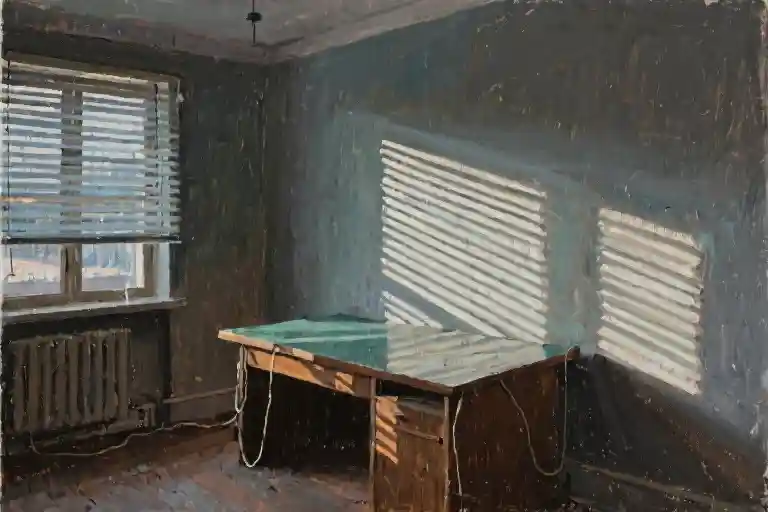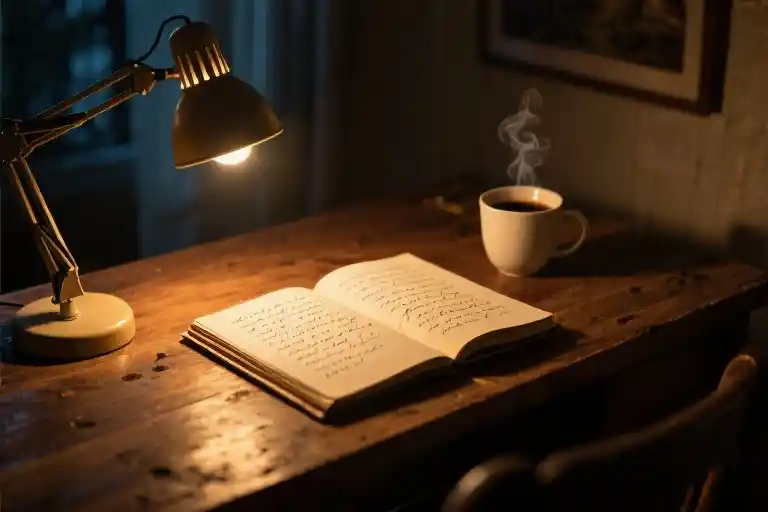The blinds have been down for thirty-seven days now. Sunlight still finds its way through the cracks, persistent as a door-to-door salesman peddling happiness I didn’t order. ‘No thanks,’ I tell the strips of light painting my forearms, though we both know I’m not really in control here. The strings dangle within reach, but touching them would mean admitting I want to see outside, or worse—that someone outside might see in.
My apartment smells of lemon-scented cleaner and something fainter underneath—maybe the ghost of last month’s spilled beer, maybe the metallic tinge of words I swallowed instead of saying. The promotion letter sits framed on my otherwise empty desk, its corporate jargon gleaming under the artificial light. ‘Aren’t you proud?’ I ask the silence, which responds by reminding me how the HR manager’s eyes flickered when she mentioned the salary bump. They always look at your shoes when they’re lying.
Outside, a lawnmower growls to life. I count the seconds until my neighbor’s manicured grass surrenders its height. Three beers from now, the sound will blend with the hum of my laptop fan, both just white noise beneath the real question: When did mowing lawns become a sacrament for grown men? We kneel before our patches of earth, trimming away chaos with gasoline-powered devotion, pretending we’re not also cutting down whatever wildness might have survived in us.
The blinds rattle as a truck passes. Through the slats, I catch fragments of movement—a woman laughing into her phone, a kid kicking a pebble, lives moving in full color while mine exists in these striped shadows. Part of me wants to yank the cords up violently. The smarter part remembers how sunlight shows dust on furniture I never bought, how windows work both ways. They’ll see the empty spaces, the takeout containers stacked like modern art, the way my hands shake when nobody’s supposed to be watching.
Roman, I whisper to the stale air, you’re working on a novel. This matters. The sentence hangs between me and the blinking cursor, almost true enough to believe. Somewhere beyond these blinds, the sun keeps rising without my permission. Somewhere inside, a character is learning how to lower his.
Defensive Routines
The promotion email arrived at 3:17 PM. A crisp corporate font announcing my new title, followed by six exclamation points from HR. I forwarded it to my mother with the subject line: “Aren’t you proud?” then immediately regretted the childish punctuation. The reply came three hours later – a thumbs-up emoji and a question about whether the raise would cover assisted living costs.
Saturday morning found me attacking the lawn with mechanical precision. The mower’s roar drowned out the neighbor’s podcast about mindfulness. Each pass left orderly stripes like prison uniforms. When the hedges surrendered to my clippers, I sprayed herbicide along the fence line – that satisfying hiss of chemical warfare against dandelions that dared show their yellow faces.
Six empty bottles stood sentinel on the kitchen counter. The seventh balanced on my knee as I stared at the blinds. Someone had told me once that grief is just love with nowhere to go. My version came in IPA bottles and the sharp tang of Roundup. Three beers in, the herbicide started smelling like childhood – that hospital disinfectant scent clinging to my father’s scrubs when he returned from night shifts.
At midnight I composed an email to my editor: “Attached is the piece about coastal erosion. P.S. Do you ever feel like a ghost editing your own life?” Deleted the second sentence. Sent. The blinds trembled in the air conditioning draft, their strings swaying like hanged men. Outside, a car alarm wailed through the neighborhood – modern birdsong for the emotionally numb.
My phone buzzed with a calendar alert: “Team brunch Sunday!” I pictured their faces when I’d describe my weekend. The promotion. The pristine lawn. Never the part where I counted ceiling cracks instead of sleeping. The seventh bottle slipped from my grip, rolling under the couch where last month’s unopened therapy bill lay gathering dust.
Anger Like a Splinter
The first time I noticed it, I was drinking coffee by the window—black, no sugar, the way you take yours when pretending to be functional. A woman walked her dog past my apartment, glanced up, and for half a second our eyes met through the blinds. Her pupils dilated like camera lenses adjusting focus. That’s when I knew: they’re all surveillance equipment disguised as humans.
My apartment has exactly three pieces of furniture: a laptop that overheats when I open more than two browser tabs, a folding chair that leaves grid marks on my thighs, and a mattress on the floor that sighs louder than I do. The walls are bare except for the shadow of a clock I never hung. Sometimes I catch myself staring at that ghost-rectangle where a clock should be, waiting for invisible hands to move.
Neighbor laughter seeps through the walls—the kind that bursts suddenly, like a soda can shaken too long. My fingers dig into the window frame until crescent moons bloom in the cheap particle board. It’s the same feeling as when colleagues say We should grab drinks sometime with the enthusiasm of someone reading a EULA agreement.
Here’s the thing about isolation: it doesn’t feel like solitude. It feels like being the only unscripted character in a reality show. Everyone else has their lines prepared—How’s the novel coming? You look tired Are you seeing someone?—while I’m fumbling with ad-libs, my pauses edited out of their highlight reels.
The laptop hums. A notification pops up—someone liked my post about magical realism. I stare at the blinking cursor in my draft, where a character keeps boarding trains but never arrives anywhere. Outside, the woman with the camera eyes walks back, her dog sniffing at my door. I lower the blinds completely this time. The plastic slats click like teeth closing.
When the Blinds Move Themselves
The blinds in my apartment have developed a life of their own. I first noticed it last Tuesday when I came home to find them raised halfway, though I distinctly remembered pulling them down that morning. At first I blamed the wind, then the faulty mechanism, then the neighbor’s cat – anything but the obvious truth that my surroundings were beginning to rebel against my carefully constructed isolation.
You really think you can keep everything out? The coffee mug on my desk says this one morning, its chipped rim forming what might be a smirk. I stare at it, waiting for more, but it just sits there radiating smug ceramic silence. The steam rising from it spells out words I can almost read before they dissolve.
These small mutinies against reality cluster around dawn and dusk, those dangerous hours when the light plays tricks. The blinds rise and fall like the chest of someone sleeping. My reflection in the window winks at me when I’m not looking. The chair sighs dramatically when I sit down to write, as if protesting the weight of all the words I haven’t said aloud.
What unsettles me most isn’t the phenomena themselves, but how unsurprised I feel. When the refrigerator hums the chorus of that song I’ve been avoiding since the breakup, I simply nod and pour another drink. When my shadow detaches itself to pace the room while I’m working, I just scoot my chair to give it more space.
There’s a particular kind of loneliness that comes not from being unseen, but from being seen too completely by the wrong audience. The walls here know me better than most people ever did. The coffee mug remembers every half-formed thought I’ve whispered over it. Even the damn blinds track my movements with their slatted pupils.
At 4:37 AM, when the hallucinations are supposed to stop according to all decent rules of magical realism, I notice the coffee cup’s chip has grown. It’s not an imperfection anymore but an intentional opening, like a mouth or a wound. Through it I can see yesterday’s coffee, last week’s coffee, all the coffees I’ve ever drunk in this apartment still swirling beneath the surface. The cup contains more time than it should.
I reach to throw it away but stop when the handle brushes my pinky finger – a gesture almost like holding hands. We stay like that for six breaths before I set it back down carefully. Some boundaries, once crossed, can’t be uncrossed. The cup knows this. The blinds know this. I’m the slow learner in the room.
When true morning comes, the apartment returns to its usual state of plausible deniability. The blinds hang motionless. The coffee cup is just a coffee cup. But the chip remains, and through it I swear I can hear something typing on my laptop in the other room.
The Crack Where the Light Gets In
The cursor blinks on an empty document, mocking me with its rhythmic pulse. I’ve written the same sentence twelve times now—The man who couldn’t land stood at the edge of the roof—and deleted it thirteen. My coffee has gone cold, but the mug still whispers in italics: Nobody cares about your flying man. The blinds are drawn, but sunlight outlines each slat like a prison bar.
Writing feels like trying to catch smoke with bare hands. My protagonist refuses to obey the laws of gravity or narrative structure. He hovers above every scene I construct, untethered, while I anchor myself to this creaking office chair with the weight of grocery lists and unread Slack messages. There’s a metaphor here about creative resistance, but I’m too tired to excavate it.
Three a.m. The keyboard clicks sync with the dripping kitchen faucet until the sounds merge into something resembling music. Words begin falling faster than I can arrange them into meaning:
They told him landing would be easy if he just stopped flapping his arms. What they didn’t understand was the wind had gotten into his bones years ago. Now when he sleeps, his feet never quite touch the mattress.
The screen glows blue in the dark room. For the first time today, my breathing matches someone else’s rhythm—this imaginary man suspended between sky and pavement. His perpetual flight isn’t heroic; it’s just what happens when you forget how to fold your wings.
Rain starts around dawn. The tapping on the window blends with keystrokes until I can’t distinguish weather from work. The blinds tremble in some unfelt breeze, their pull-cord swaying like a pendulum counting down to nothing. That’s when the sentence arrives, fully formed:
Some falls happen in slow motion across decades.
I don’t know if it belongs in the novel or my obituary. The coffee mug has gone quiet. Outside, the storm eases into a hesitant drizzle. My finger hovers over the blinds cord—frayed from years of aggressive yanking—but doesn’t pull. Not yet.
Hey, I’m Roman. My protagonist still hasn’t landed, but yesterday I bought a secondhand bookshelf without worrying about when I’ll need to move it.
The string dangles from the blinds, swaying slightly in a draft I can’t quite locate. It’s been there for months—maybe years—this frayed nylon cord that could pull the slats open with one sharp tug. But my hand always stops halfway. Better to let the sunlight come through the cracks in measured doses, like a controlled substance.
On the desk, my coffee cup has developed a hairline fracture near the handle. It whispers things to me now when the apartment gets too quiet. They’re still watching, it says. Even through the blinds. I drink the last cold sip and consider throwing it against the wall. Instead, I run my thumb along the chip in the porcelain, feeling the roughness like a braille message: This is how things break.
The novel manuscript glows on my screen—a story about a man who learns to levitate but forgets how to land. His apartment fills with furniture he never uses, each piece nailed to the floor in case gravity returns. My neighbors would probably call the cops if they saw me laughing at my own writing at 3 AM. Good thing the blinds are down.
There’s a new indent on the windowsill where I’ve been pressing my forehead. Outside, someone’s lawnmower coughs to life. I imagine them methodically cutting neat rows, pretending the grass won’t grow back wilder. We all have our rituals. Mine involve typing furiously until my hands cramp, then staring at the ceiling while the coffee cup mutters obscenities.
Hey, I’m Roman. In my novel, the floating man finally buys a sofa—not to sit, but to prove he could choose to land. The receipt stays in his pocket, creased with possibility. Maybe tomorrow I’ll pull that cord and let the morning light flood in. Or maybe I’ll just write about someone who does.





